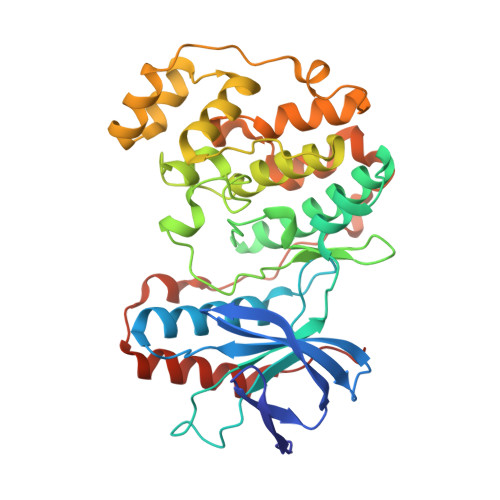Identification of Novel P38Alpha Map Kinase Inhibitors Using Fragment-Based Lead Generation.
Gill, A.L., Frederickson, M., Cleasby, A., Woodhead, S.J., Carr, M.G., Woodhead, A.J., Walker, M.T., Congreve, M.S., Devine, L.A., Tisi, D., O'Reilly, M., Seavers, L.C., Davis, D.J., Curry, J., Anthony, R., Padova, A., Murray, C.W., Carr, R.A., Jhoti, H.(2005) J Med Chem 48: 414
- PubMed: 15658855
- DOI: https://doi.org/10.1021/jm049575n
- Primary Citation of Related Structures:
1W82, 1W83, 1W84, 1WBN, 1WBS, 1WBT, 1WBV, 1WBW - PubMed Abstract:
We describe the structure-guided optimization of the molecular fragments 2-amino-3-benzyloxypyridine 1 (IC(50) 1.3 mM) and 3-(2-(4-pyridyl)ethyl)indole 2 (IC(50) 35 microM) identified using X-ray crystallographic screening of p38alpha MAP kinase. Using two separate case studies, the article focuses on the key compounds synthesized, the structure-activity relationships and the binding mode observations made during this optimization process, resulting in two potent lead series that demonstrate significant increases in activity. We describe the process of compound elaboration either through the growing out from fragments into adjacent pockets or through the conjoining of overlapping fragments and demonstrate that we have exploited the mobile conserved activation loop, consisting in part of Asp168-Phe169-Gly170 (DFG), to generate significant improvements in potency and kinase selectivity.
Organizational Affiliation:
Astex Technology, 436 Cambridge Science Park, Milton Road, Cambridge, CB4 0QA, United Kingdom. a.gill@astex-technology.com















